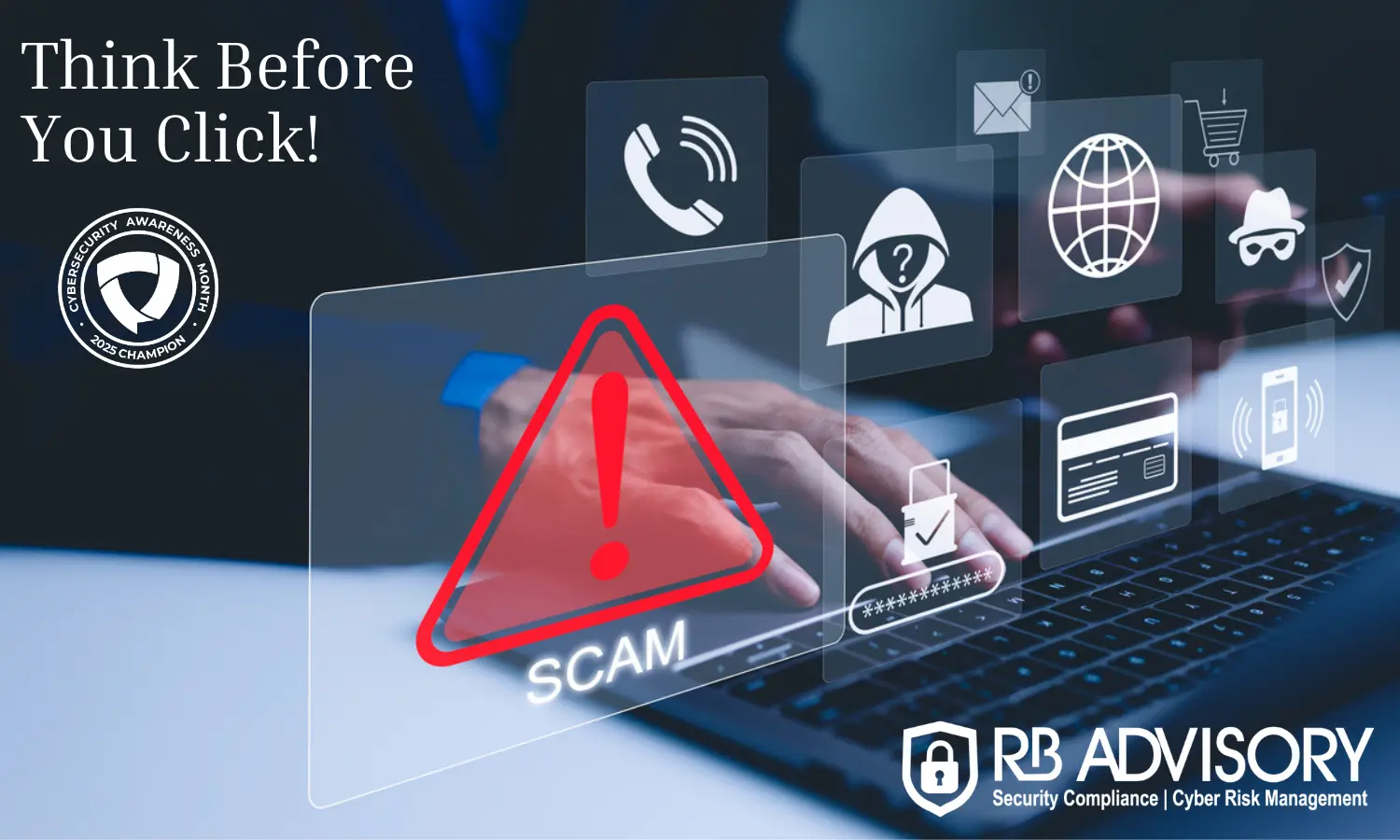
Think Before You Click: How to Identify and Avoid Scams in a Hyperconnected World
Recognizing National Cybersecurity Awareness Month with RB Advisory
Every October, National Cybersecurity Awareness Month (NCSAM) serves as a timely reminder that cybersecurity isn’t just about firewalls and code, it’s about people, decisions, and vigilance. In today’s digital-first world, one of the most persistent and costly threats comes in a deceptively simple form: scams.
Scams have evolved. They’re no longer just phishing emails riddled with typos or phone calls from fake IRS agents. Modern scams are engineered with psychological precision, backed by stolen data, and fueled by global cybercrime syndicates. And they’re working, Americans lost over $10 billion to fraud in 2023 alone, according to the Federal Trade Commission.
At RB Advisory, LLC, we’ve seen firsthand how quickly a well-timed scam can compromise entire networks, damage reputations, and trigger regulatory nightmares. Whether you’re a business leader, a government contractor, or simply a digital citizen, your best defense is knowledge.
Why Scams Are So Dangerous (and So Effective)
Scams exploit the most unpredictable component in any cybersecurity system: human behavior.
Sophisticated scams can impersonate company executives, spoof trusted websites, or use deepfake audio to trick employees into transferring funds or handing over credentials. The goal is always the same: get you to act quickly before you think critically.
Key types of scams include:
- Phishing & Spear Phishing: Emails that look legitimate but are designed to steal passwords or install malware.
- Smishing: Text messages from “banks” or “delivery services” asking you to click a malicious link.
- Business Email Compromise (BEC): Fraudsters pose as company executives to request urgent wire transfers.
- Tech Support Scams: A pop-up or call saying your system is infected — and asking you to let them in to “fix it.”
Red Flags: How to Spot a Scam Before It Strikes
USAA’s recent guide outlines some practical signs to watch for, and we couldn’t agree more. At RB Advisory, we recommend training your teams to look for the following:
- Urgency: “Act now!” or “Your account will be closed!” are common scare tactics.
- Unknown senders or odd email domains: Always inspect the email address, not just the display name.
- Spelling errors or awkward grammar: Professional organizations rarely make repeated mistakes.
- Suspicious links: Hover over links to see the real URL before clicking.
- Unusual payment requests: Asking for payment via gift cards, crypto, or third-party apps is a red flag.
For Business Leaders: Scams Are a Risk Multiplier
For organizations, scams aren’t just a nuisance, they’re an attack vector.
A single employee who clicks on a malicious link could inadvertently open the door to a full-scale data breach, ransomware infection, or wire fraud. And when it happens, regulators, customers, and the media won’t care that it “started as a mistake.” They’ll want to know how you were prepared.
That’s why cybersecurity awareness training, phishing simulations, and role-based access controls are more than best practices, they’re essential layers of defense.
Expert Insight from The Cyber Queen™
Regine Bonneau, Founder and CEO of RB Advisory, known as “The Cyber Queen™” puts it this way: “Scams are designed to bypass your technology and target your trust. The best cybersecurity investment you can make is educating your people. Because when awareness meets strategy, your organization becomes scam-resistant. At RB Advisory, we don’t just help clients defend data – we help them defend decisions.”
What You Can Do Right Now
Whether you’re a small business owner, enterprise IT lead, or working parent, you can take action today to reduce your exposure to scams:
- Educate your team – Run monthly phishing simulations and cyber awareness sessions.
- Use multi-factor authentication (MFA) – Always enable it for email, banking, and critical systems.
- Verify requests offline – Always confirm unexpected money transfers or sensitive requests via a second method (e.g., phone call).
- Limit information sharing – Don’t overshare on social media; scammers use personal details to craft convincing messages.
- Report suspicious activity – Don’t delete it — report it. Train staff to send it to IT or security teams.
How RB Advisory Helps You Stay Scam-Smart
RB Advisory supports companies across industries in building strong cyber postures that resist social engineering and fraud. Our services include:
- Cybersecurity awareness training
- Phishing simulations and staff assessments
- Incident response planning
- Policy development for fraud prevention
- Third-party risk assessments and compliance support
From healthcare and finance to government contracting and education, our clients trust us to not just keep them compliant but keep them protected.
Final Thoughts: Trust Is Earned. Protection Is Built.
Scammers don’t care how big or small your organization is, only how vulnerable. National Cybersecurity Awareness Month is a chance to elevate the conversation, empower your teams, and take practical steps to stay ahead of attackers.
At RB Advisory, we make cyber confidence happen. Let us help you build a culture where vigilance is second nature and security is everyone’s responsibility. Schedule a 30 minute consultation today!
About RB Advisory
RB Advisory LLC is a leading cybersecurity and compliance firm helping organizations reduce risk, meet regulatory requirements, and strengthen their cyber posture. Led by cybersecurity expert and keynote speaker Regine Bonneau, “The Cyber Queen™,” RB Advisory empowers clients across sectors to stay secure in a rapidly evolving digital landscape.


